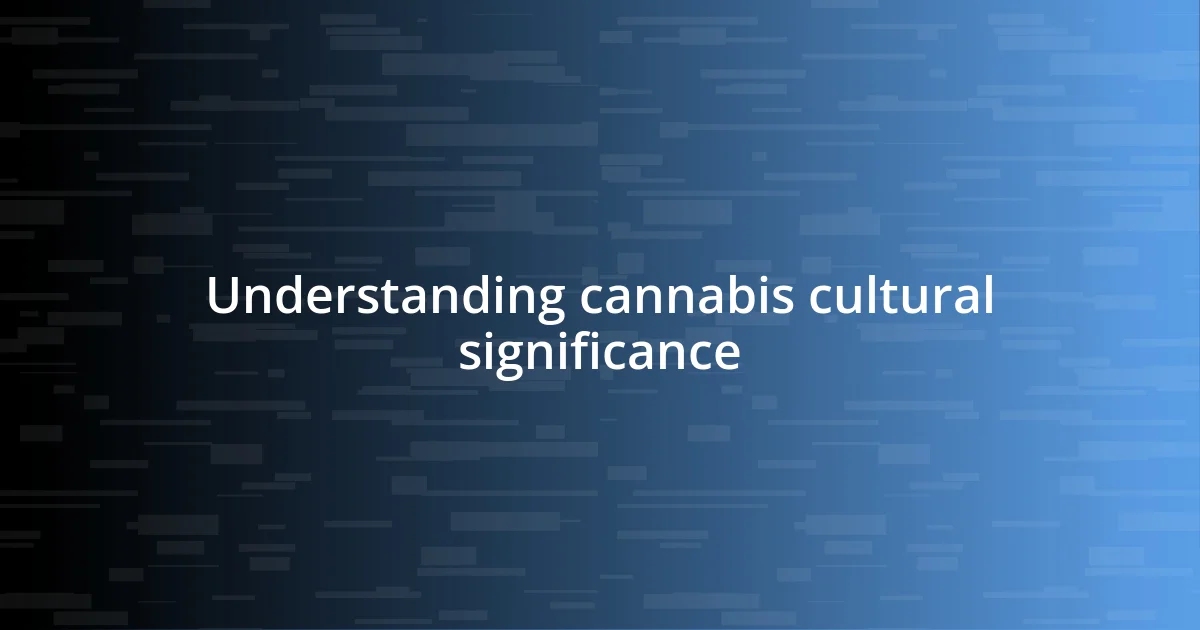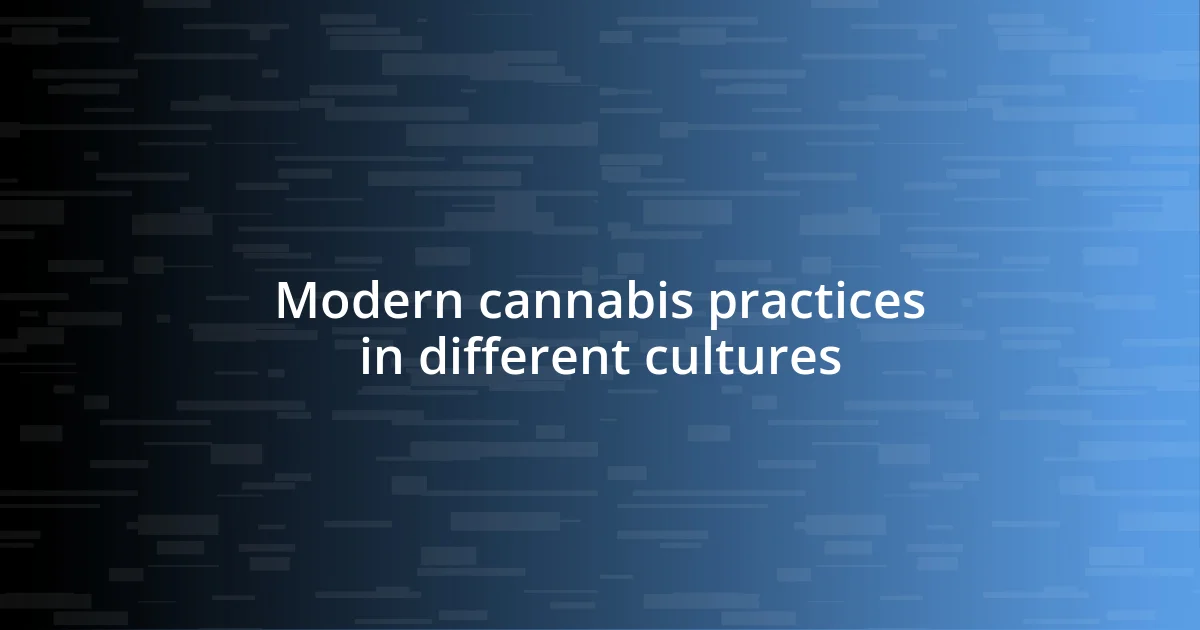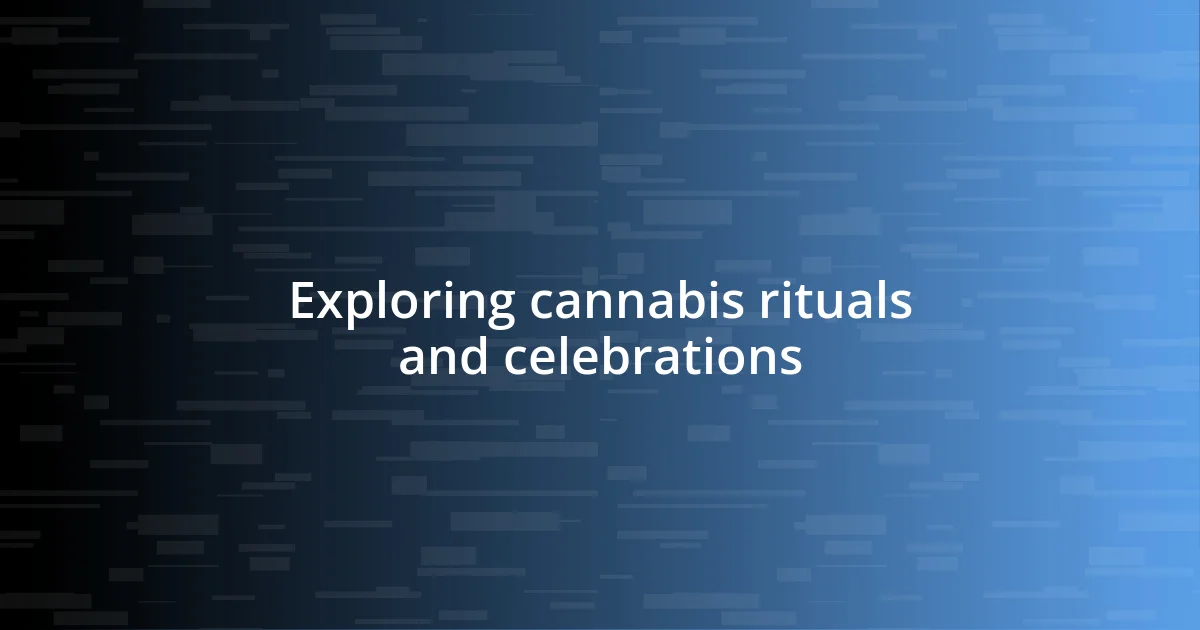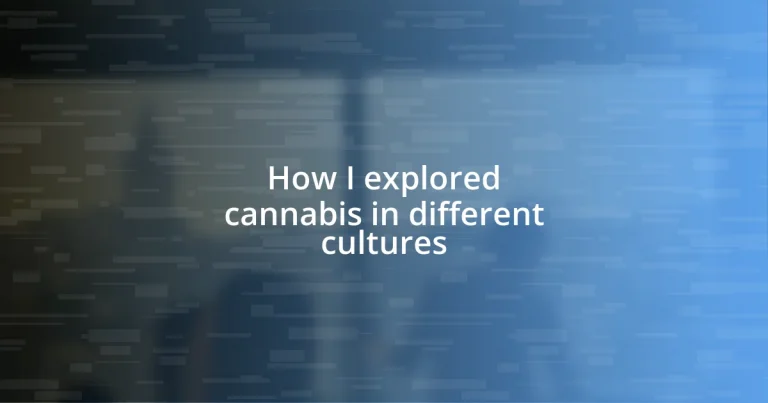Key takeaways:
- Cannabis has a rich cultural significance, serving as a sacred plant in various traditions, notably in Hindu rituals and indigenous ceremonies that foster community and connection.
- Historically, cannabis has been utilized for multiple purposes, including medicinal applications in China, spiritual practices in ancient Egypt, and communal bonding in Africa, illustrating its deep-rooted connection to human experience.
- Modern perceptions of cannabis have evolved, with its acceptance in places like Canada and Jamaica highlighting its role in social gatherings and rituals, while stark regulatory contrasts in different regions showcase the complex relationship between culture and legality.

Understanding cannabis cultural significance
Cannabis has deep roots in various cultures, often serving as a sacred plant with significant spiritual value. I remember visiting a Hindu festival in India, where cannabis, known as ‘bhang,’ was not just a recreational substance but a part of religious rituals. Seeing people pass around this green concoction while chanting prayers made me wonder: how can something so simple carry such profound meaning?
In many indigenous cultures, cannabis is intertwined with healing practices and communal bonding. One time, I attended a gathering with a Native American community, where they shared stories of how their ancestors used the plant during ceremonies to connect with the spirit world and promote health. It touched me deeply to see how cannabis fostered a sense of unity, sparking conversations that bridged generations.
Looking at cannabis through a cultural lens reveals its multifaceted roles beyond just consumption. Have you ever considered how cannabis can symbolize resistance and resilience? In places where cannabis is still stigmatized, it has become a form of rebellion against oppressive societal norms. Observing this dynamic made me reflect on my own experiences with the plant and its evolving narrative in today’s world.

Historical uses of cannabis worldwide
Cannabis has been utilized historically for various purposes across the globe, deeply influencing rituals and medicinal practices. For example, in China, cannabis seeds and fibers date back thousands of years, serving as staples in traditional medicine and textiles. I once came across an ancient text in a small village that spoke of the plant’s ability to alleviate pain and stimulate appetite. It made me appreciate how cultures have long recognized cannabis’s potential long before its modern resurgence.
In ancient Egypt, cannabis wasn’t solely revered for its physical properties; it played a crucial role in spiritual practices. During a visit to a museum in Cairo, I learned that psychotropic uses of cannabis were linked to religious ceremonies, chronicled in hieroglyphs and papyrus scrolls. I felt a sense of connection as I stood before these artifacts, realizing that people sought a deeper spiritual connection through this plant centuries ago, much like many do today.
Meanwhile, in Africa, the plant was traditionally incorporated into folk healing rituals and community gatherings, often accompanied by music and dance. Reflecting on my experience in a West African village, I vividly remember the celebrations around the harvest, where cannabis infused both the song and spirit of unity amongst the people. It struck me how cannabis has long been a medium for cultural expression and shared human connection, a thread woven into the fabric of diverse societies.
| Region | Uses |
|---|---|
| China | Medicinal and textile applications |
| Egypt | Spiritual and religious practices |
| Africa | Folk healing and community bonding |

Cannabis traditions in ancient societies
Cannabis traditions in ancient societies reveal a rich mosaic of cultural significance and rituals. For instance, in ancient India, the use of cannabis can be traced back thousands of years, often intertwined with religious practices. During my journey through the lush landscapes of the Himalayas, I encountered a group of priests who incorporated cannabis into their offerings to the deities. Watching them blend the herb into sacred preparations reminded me that this was more than just a plant; it was a vital part of their spiritual communication.
Additionally, in the Scythian culture, known for their nomadic lifestyle, cannabis played a fascinating role. Historians note that these ancient warriors used to inhale the smoke from burning cannabis seeds to achieve an altered state of consciousness during their rituals. Imagine standing in those ancient steppes, feeling the echoes of drumming and chants as the smoke spiraled upward, symbolizing a bridge between the earthly and the divine.
Here are some specific examples from various ancient societies:
- India: Cannabis used in religious festivals and offerings, known as ‘bhang’ during Hindu celebrations.
- Scythia: Ritualistic use of cannabis smoking to facilitate spiritual experiences among warrior tribes.
- Sumeria: References to “the joy plant” in ancient texts, highlighting its sacred and celebratory role in rituals.
- China: Medicinal use documented as early as 2800 BC, emphasizing its healing properties in ancient herbalism practices.
These unique applications highlight how cannabis has been woven into the social and spiritual fabric of various cultures, serving as a catalyst for connection and transcendence throughout history.

Modern cannabis practices in different cultures
Modern cannabis practices today are a fascinating reflection of cultural evolution and acceptance. In Canada, for instance, I witnessed firsthand how cannabis has transitioned from a stigmatized substance to a celebrated part of daily life, especially in social gatherings. People would casually share different strains with one another, discussing their effects as if they were fine wines. Isn’t it interesting how what was once taboo is now a point of conversation over dinner?
In Jamaica, the Rastafarian community continues to uphold the spiritual significance of cannabis, often referring to it as “ganja.” During my time there, I attended a Reggae festival where the use of cannabis was not just accepted but integrated into the music and communal vibe. Watching people pass around joints as they danced made me reflect on the unity and joy this plant has fostered for generations. It’s more than just a recreational substance; it’s a way for people to connect with their roots and express themselves.
Meanwhile, in the United States, the explosion of cannabis dispensaries has led to a diverse array of products, from edibles to oils. I remember entering a dispensary in California filled with bright packaging and knowledgeable staff eager to provide guidance. They offered strain recommendations based on personal preferences, reminding me of a trendy café where you can select just the right brew for your mood. This experience made me think: how amazing it is that cannabis can now be tailored to individual needs, much like a personalized approach to wellness?

Comparative analysis of cannabis regulations
Cannabis regulations around the world illustrate a diverse landscape of legal frameworks and cultural perceptions. In Uruguay, for example, I marvel at the government-sponsored approach to cannabis, where the cultivation and sale of the plant are fully regulated, fostering a sense of responsibility and community. Watching locals casually visit government-approved pharmacies to purchase cannabis was enlightening; it made me ponder the benefits of a system that prioritizes safety and social equity.
On the other hand, I found the situation in the U.S. quite striking. With individual states setting their own rules, I could feel the contrast as I traveled from California’s liberal dispensaries to the more conservative regulations in states like Texas, where cannabis remains largely prohibited. It’s fascinating, yet sometimes frustrating, to see how much space and value cannabis holds on one side of a border versus the other. It really brings to mind the question: how can such a similar substance be thought of so differently in neighboring regions?
In contrast, the complete prohibition of cannabis in countries like Afghanistan underscores a stark reality where cultural views are shaped by state control rather than community practices. While I was there, the bitterness of regulation hung in the air like a cloud over people’s traditions, reminding me of how deeply intertwined cannabis is with identity in various cultures. It’s not just about legality; it’s about the stories, the emotions, and the context that shape the very fabric of society.

Exploring cannabis rituals and celebrations
In the Hindu festival of Holi, I discovered a vibrant cloud of color and camaraderie intertwined with cannabis traditions, particularly in parts of India. Throughout the celebration, I met people who shared bhang, a potent cannabis-infused drink. Seeing everyone come together, laughing and enjoying life, I couldn’t help but wonder: how does a simple plant elevate such deep-seated cultural joy? It became clear to me that cannabis plays a role in enhancing the communal experience, where the act of sharing it brings people closer.
During my travels to Morocco, I encountered the unique practice of consuming kif—a traditional blend of cannabis and mint. This wasn’t just a leisurely pastime; it was part of elaborate tea ceremonies that symbolize hospitality. As I sat with locals, sipping tea and inhaling the fragrant smoke, I felt an undeniable warmth enveloping us, a reflection of shared stories and cultural pride. It made me appreciate how cannabis can transcend mere consumption and transform into a ritual that binds communities together.
Additionally, while attending a cannabis-focused event in Amsterdam, I observed the special way that cannabis is celebrated as an art form. Artists displayed their work alongside cannabis plants, creating an immersive experience that sparked conversations about creativity and inspiration. I remember talking to an artist who expressed how cannabis enhances their artistic flow; it led me to think—could this plant truly be a muse for many? In these moments, it became clear that the exploration of cannabis rituals is rich and multifaceted, revealing layers of connection, creativity, and culture.

Personal reflections on cultural experiences
As I wandered through the vibrant streets of Jamaica, I was struck by the cultural reverence for cannabis, known locally as ganja. Sitting on the porch of a small guesthouse, I shared a joint with a local artist, who spoke passionately about Rasta culture and the spiritual significance of the plant. Listening to his stories, I felt a profound connection; it was as if I was witnessing history and tradition wrapped in every puff. How does a simple plant weave itself so deeply into the fabric of a people’s identity?
During a visit to the Swiss Alps, I joined a group of nature enthusiasts for a hike, where we celebrated the beauty of the land with the occasional puff of cannabis. The crisp air and breathtaking views created a serene backdrop for thoughtful conversations about mindfulness and connection to nature. I remember looking at my companions—their eyes sparkling with joy and clarity—and it struck me how cannabis, in such serene settings, becomes a tool for introspection and unity. Isn’t it fascinating how setting can elevate an experience to something transcendental?
Reflecting on my exploration, I can’t help but notice that cannabis often serves as a bridge across cultures. Whether it’s a ceremonial cup of bhang, a communal smoke in the mountains, or the vibrant discussions it inspires in art spaces, each interaction deepens my understanding. I often find myself asking: what stories do other people’s relationships with cannabis tell about their lives? Each unique experience resonates deeply with me, reminding me that cannabis is more than a substance; it’s a shared narrative that binds us all.














